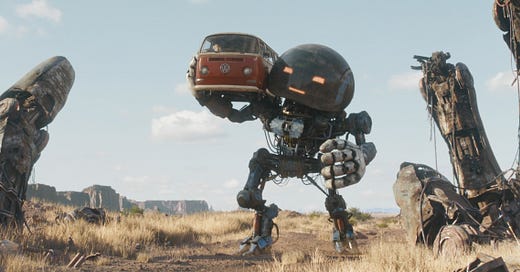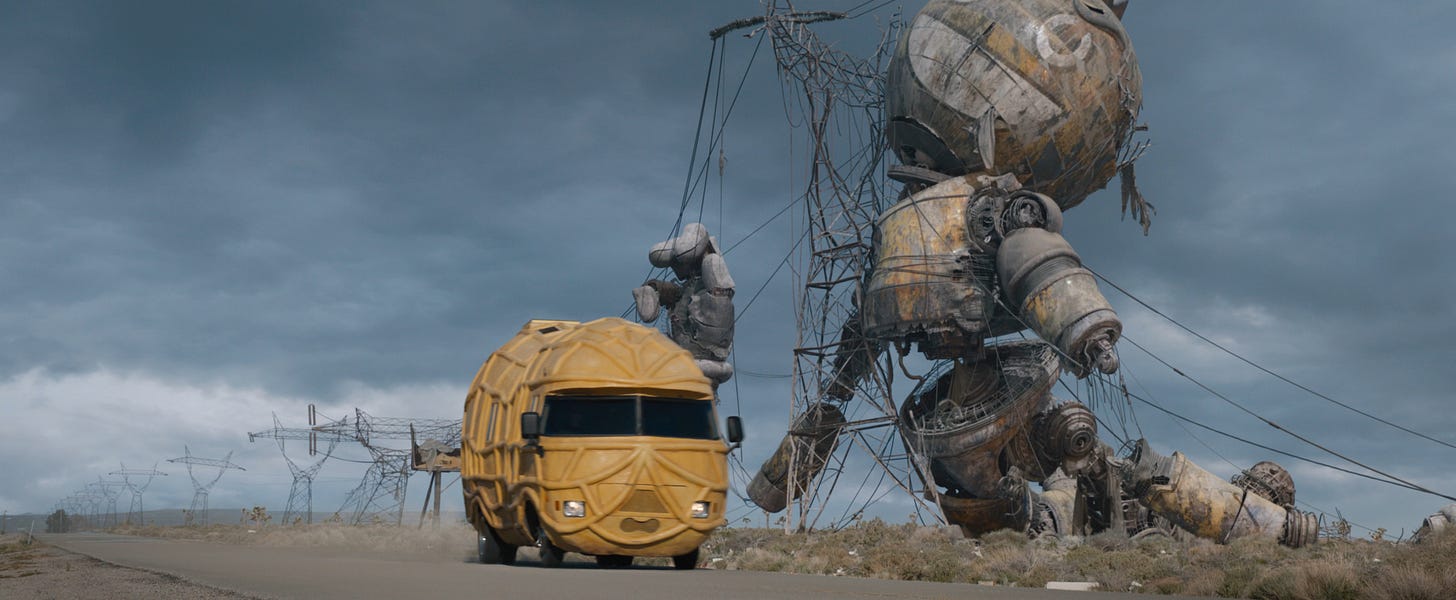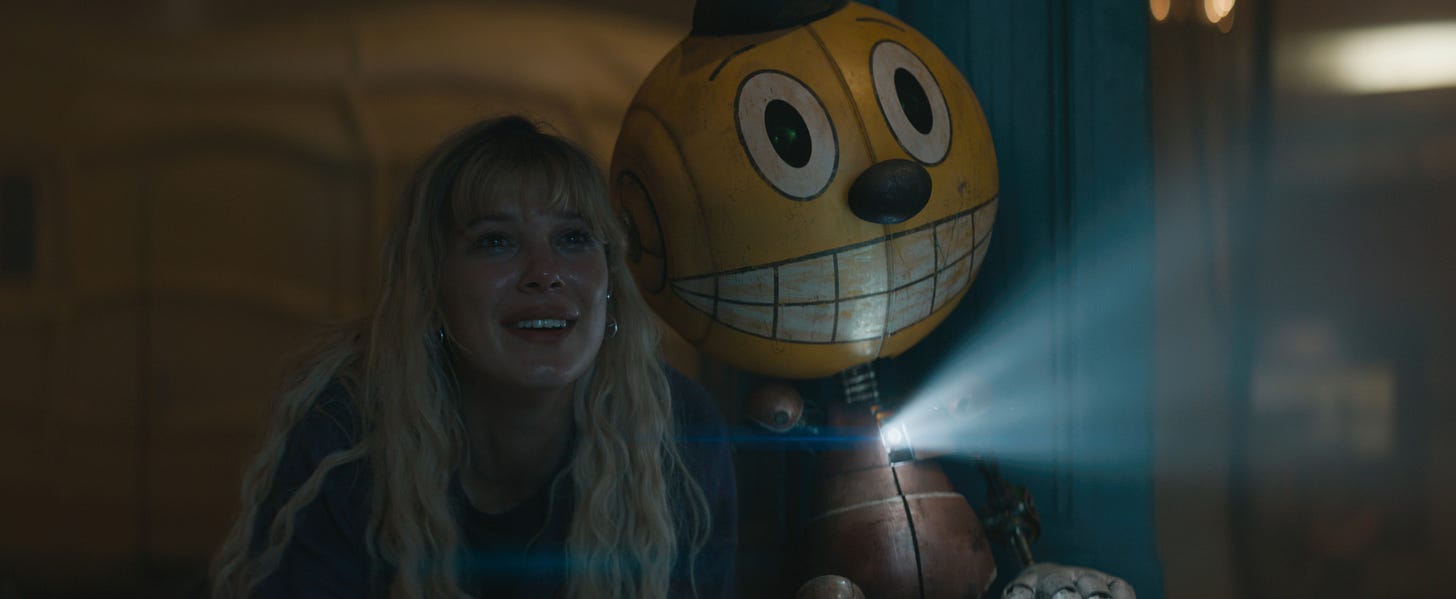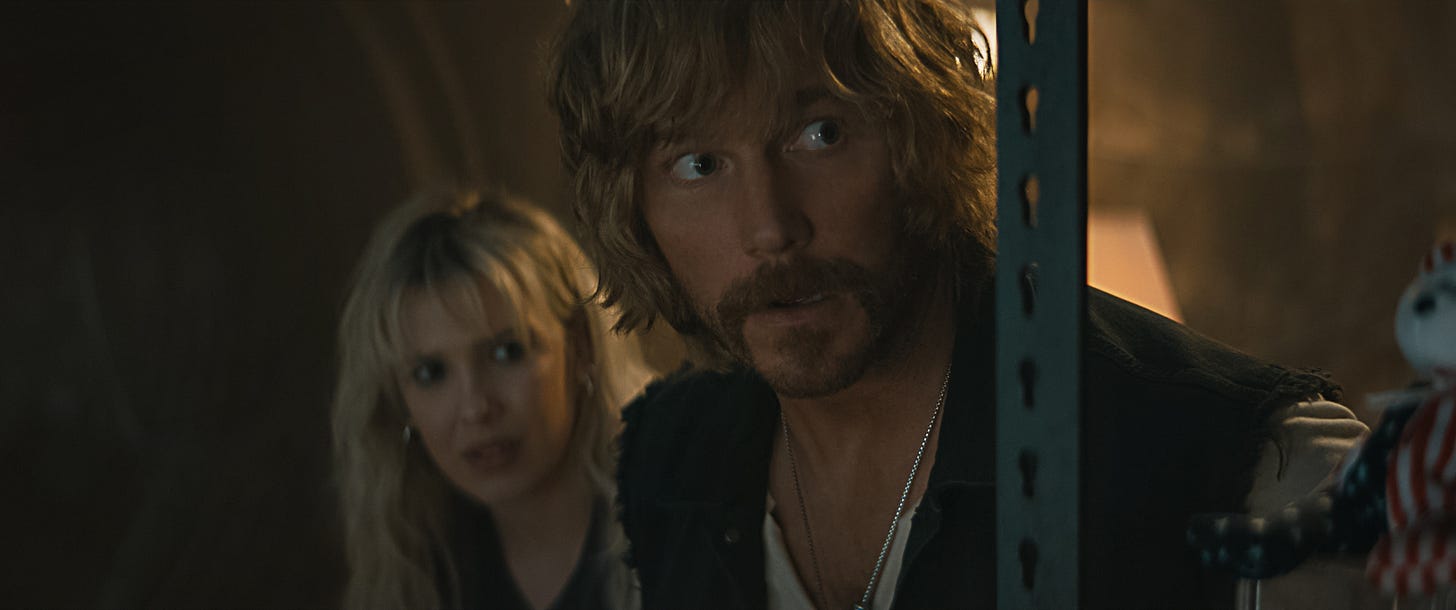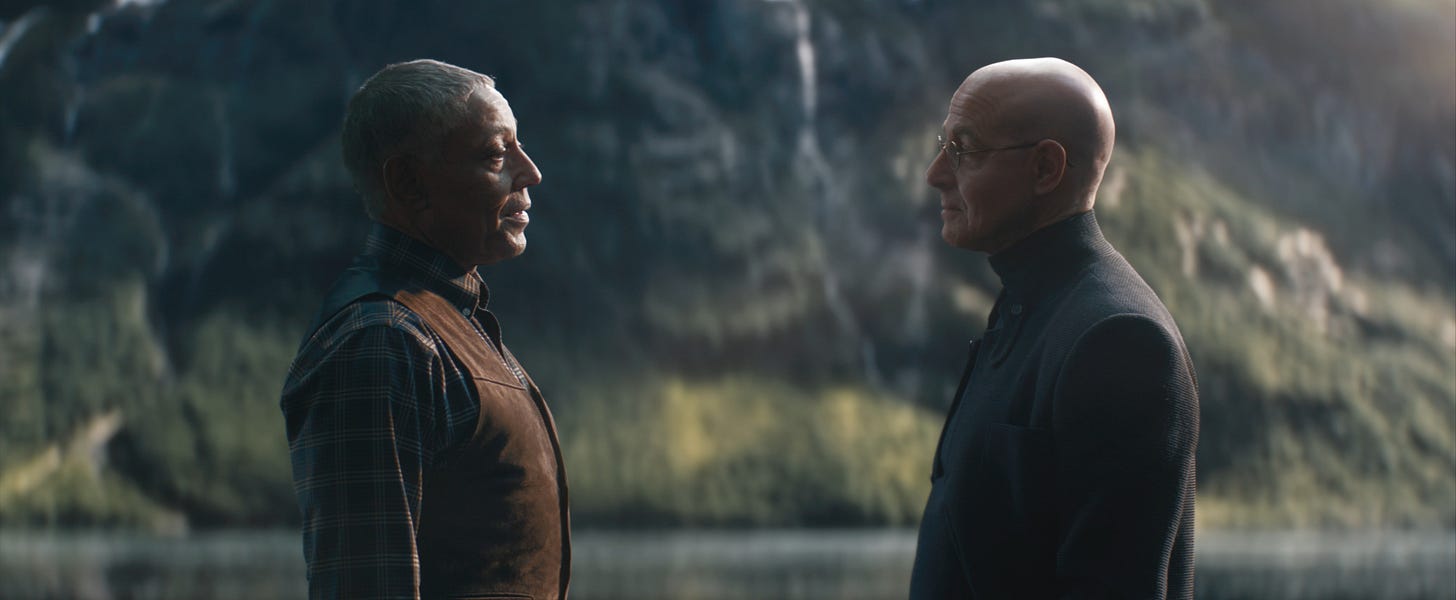Review: 'The Electric State'
Simon Stålenhag's dystopian masterpiece comes to life in Netflix's new sci-fi road trip.
If you’re a nerd like me, you’ve might have heard the name Simon Stålenhag. The Swedish illustrator and author gained recognition in 2015 with his book Tales from the Loop, where he invited us into an ’80s Sweden inspired by his childhood imagination.
Stålenhag’s books revolve around fantasy and childhood nostalgia. Kids, often on BMX bikes, dressed in colorful puffer jackets with Walkmans strapped to their heads, ride out on endless adventures in a world full of mysteries.
Giant robots, overgrown high-tech structures among rustic fields and well-worn Volvos, time travel, dinosaurs on the loose — everything existed in this dreamworld he imagined as a child. At the heart of these mysteries was Sweden’s grand (and very fictional) particle accelerator, the source of all supernatural events in Stålenhag’s little town.
Stålenhag’s lavishly illustrated book blended ’80s nostalgia with a futuristic sci-fi aesthetic that felt seamlessly integrated into its world. Tales from the Loop quickly became a bestseller and was later adapted into a tabletop RPG à la Dungeons & Dragons, allowing players to play characters — most often the aformentioned kids on BMX bikes — in this imaginative universe. Published by the Swedish company Free League Publishing, the game went on to win several awards.
In 2020, Amazon Studios adapted Tales from the Loop into a miniseries, now available on Prime Video. The book also spawned two sequels: Things from the Flood and The Electric State, the latter of which we’ll be looking at today — or more precisely, Netflix’s adaptation of it.
With Tales from the Loop, The Electric State is the second adaptation of Simon Stålenhag’s extraordinary world. The story takes place in the U.S. after a massive war, where robots rebelled against their human masters after years of servitude.
After their defeat, with humans using their own VR-controlled robots to win the war, the surviving machines were sent to a massive desert reservation, enclosed by an enormous wall. The crucial VR technology that helped win the war was soon repurposed for entertainment and later became a form of escapism.
By donning a VR headset, the conscious part of the human brain could, for example, take a “vacation” in the Caribbean while a drone, controlled by another part of the brain, handled everyday tasks. Addiction soon followed, and before long, humans became zombie-like, more inhuman than the enemies they had fought.
In this world, we meet orphaned Michelle (played by Millie Bobby Brown). Her family didn’t die at the hands of the robots but perished in a car accident during the war. The trauma has long since set in, and Michelle has bounced between foster homes, each worse than the last. She deeply misses her hyper-intelligent younger brother, Christopher (played by Woody Norman in flashbacks).
But when the friendly robot Cosmo (voiced by Alan Tudyk) breaks into her home and claims to be connected to her deceased brother, it sets off a dramatic road trip.
The journey begins in a desolate, post-apocalyptic suburb, where people sit motionless with VR headsets strapped to their faces. It takes her deep into the robot reservation — the electric state. The goal: to find Michelle’s brother, whom the robot insists is still alive. To do so, they must track down the mysterious Dr. Amherst (played by Ke Huy Quan), who has disappeared.
Along the way, they encounter a cast of colorful and often tragic characters, both human and mechanical. Smuggler Keats (played by Chris Pratt) and his robot companion Herman (voiced by Anthony Mackie) aid them on their journey.
We also meet a eccentric array of robots, each more unique than the last, including the robot leader Mr. Peanut (voiced by Woody Harrelson), baseball robot Popfly (voiced by Brian Cox), and mailbot Penny Pal (voiced by Jenny Slate).
They are hunted by the relentless Colonel Bradbury (played by Giancarlo Esposito), who is sent after them through the drone robot The Marshal, acting on the orders of the greedy and ruthless tech billionaire Ethan Skate (played by Stanley Tucci), the creator of the VR technology that won the war.
The Electric State is a road movie, a journey through an alternate America, and an allegory for many of today’s interpersonal challenges: prejudice, addiction, grief, communication, human connection, and the lack thereof. Much like Tales from the Loop, Stålenhag’s stories and illustrations are masterfully brought to life throughout the film’s two-hour runtime.
It’s an adventure story full of energy and momentum, but more than anything, it’s about the characters encountered along the way. The film is directed by the Russo brothers, best known for their work on the Avengers films, including Infinity War and Endgame.
The film’s fantastic visuals are balanced with both emotions and feels. Impressive special effects add to the story instead of distracting from it, making the journey engaging throughout. Millie Bobby Brown gives us a strong performance, and her dynamic with the robot Cosmo works particularly well.
Chris Pratt is… well, he’s Chris Pratt. He primarily serves as comic relief, and his character, Keats, doesn’t add much to the plot—apart from that of the guide throught the wasteland. But still, he is Chris Pratt, and paired with the robot Herman (voiced by Anthony Mackie, remember?), who has some impressive tricks up his sleeve, they work well together with their banter, especially in the action-heavy sequences. That said, the chemistry between Pratt and Millie Bobby Brown feels lacking in certain scenes.
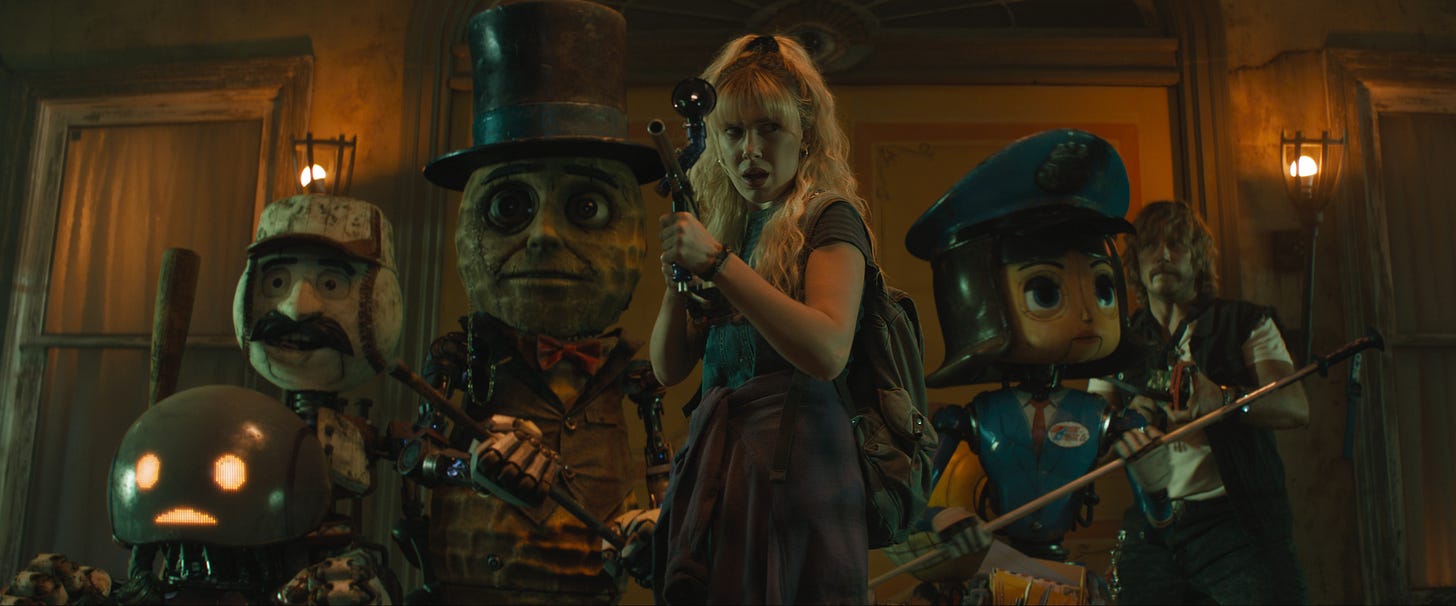
At times, the film feels a bit rushed. It’s not a major complaint, but some moments push the story forward too quickly, contrasting with sections that take their time. With such a fascinating world, I would have loved to see even more world-building— even if it meant scaling back some of the action sequences.
The book it’s based on often feels darker, melancholic and introspective, and I wish the film had leaned further into this aspect of the story. Perhaps The Electric State would have worked even better as a series, much like Tales from the Loop?
Even though the film has a somewhat lighter tone that its source material, with such a great ensemble of actors, both on screen and in the recording booth, there’s really little to complain about. If you enjoy post-apocalyptic science fiction — or even Stranger Things — this is a film I’d recommend.
And if you’re a fan of Stålenhag’s books, you’re in for a treat!
The Electric State premiers on Netflix on the 14th of March, 2025.

